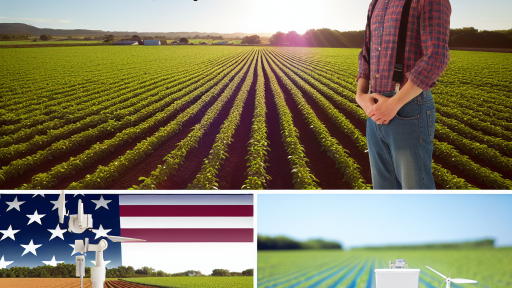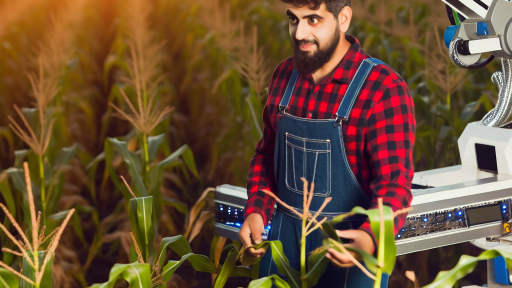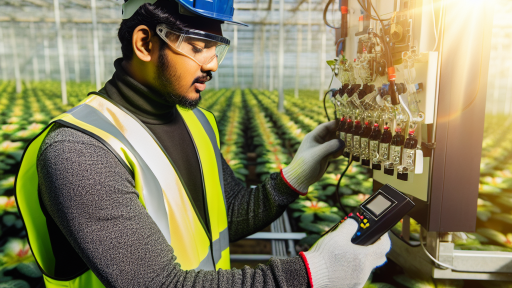Introduction to Smart Irrigation Systems and Their Importance
Smart irrigation systems utilize technology to optimize water usage.
They rely on sensors, weather data, and automated controls to function efficiently.
Consequently, they help reduce excessive water consumption in agriculture and landscaping.
This approach is especially crucial in regions facing water scarcity.
Reducing Water Waste
Traditional irrigation methods often waste significant amounts of water.
In contrast, smart systems deliver water directly to plant roots.
They adjust the amount of water based on real-time conditions.
This adaptability minimizes oversaturation and runoff.
Monitoring Climate Conditions
Smart irrigation systems incorporate weather forecasts to their operations.
Thus, they can skip watering when rain is forecasted.
This integration prevents unnecessary water use during wet conditions.
Moreover, they gather data on soil moisture levels.
This information allows for precise irrigation scheduling.
Promoting Sustainable Practices
Using smart irrigation systems promotes sustainable agricultural practices.
Farmers can achieve higher yields while conserving resources.
Transform Your Agribusiness
Unlock your farm's potential with expert advice tailored to your needs. Get actionable steps that drive real results.
Get StartedThis balance supports both economic viability and environmental health.
Additionally, many systems can connect to mobile applications.
This feature allows users to monitor and control irrigation remotely.
Case Studies and Success Stories
Many organizations have successfully implemented smart irrigation systems.
For instance, the Green Thumb Community Garden saw a 30% reduction in water use.
Similarly, Green Earth Farms improved their crop yields by employing smart technologies.
These examples illustrate the benefits of adopting advanced irrigation solutions.
Overview of Water Scarcity in Agriculture
Water scarcity affects agriculture globally.
This issue poses a severe threat to food security.
Farmers rely heavily on irrigation systems for crop production.
However, traditional irrigation methods can waste vast amounts of water.
Consequently, this leads to inefficient resource usage.
The growing demand for water exacerbates this problem.
Population growth increases food production needs.
Additionally, climate change alters weather patterns.
These factors contribute to the ongoing water crisis.
Farmers must adapt to these challenging conditions.
Impact of Climate Change
Climate change intensifies water scarcity issues.
It leads to unpredictable rainfall and severe droughts.
Such changes threaten crop yields and agricultural sustainability.
Farmers face increasing challenges in managing water resources.
They need effective solutions to cope with these changes.
Traditional Irrigation Inefficiencies
Many traditional irrigation systems are outdated.
These systems often operate on fixed schedules.
Showcase Your Farming Business
Publish your professional farming services profile on our blog for a one-time fee of $200 and reach a dedicated audience of farmers and agribusiness owners.
Publish Your ProfileAs a result, they do not account for changing weather conditions.
Therefore, they can either overwater or underwater crops.
This inefficiency leads to wasted water resources.
Addressing Water Scarcity
Solutions are essential to tackle water scarcity challenges.
Implementing smart irrigation systems can make a significant difference.
These systems optimize water usage for different crops.
Additionally, they adapt to varying weather conditions.
Smart irrigation enables farmers to conserve water effectively.
Moreover, it enhances crop yields and productivity.
This approach benefits both farmers and the environment.
How Smart Irrigation Systems Work
Overview of Smart Irrigation
Smart irrigation systems use technology to optimize water usage.
They monitor environmental conditions for efficient watering.
Moreover, they adapt watering schedules based on real-time data.
Key Technologies
Several technologies enable smart irrigation systems to function effectively.
Soil Moisture Sensors
Soil moisture sensors measure the moisture level in the soil.
These sensors alert the system when to water the plants.
Consequently, they prevent overwatering and conserve water resources.
Weather Data Integration
Weather forecasts help predict rainfall and temperature changes.
Smart systems gather data from local weather stations.
This information adjusts irrigation schedules based on weather patterns.
Automated Controllers
Automated controllers take data from sensors and weather services.
They trigger watering systems at optimal times.
As a result, they ensure plants receive the right amount of water.
Benefits of Smart Irrigation
Smart irrigation systems provide several significant benefits.
- They reduce water waste effectively.
- They promote healthier plant growth.
- Additionally, they save money on water bills.
Real-World Applications
These systems are beneficial in various settings.
For instance, farmers use them to enhance crop yields sustainably.
Furthermore, residential users benefit from less water consumption.
Delve into the Subject: Sustainable Practices in Vertical Farming Operations
Benefits of Smart Irrigation
Water Conservation
Smart irrigation systems significantly reduce water waste.
They use sensors to monitor soil moisture levels.
This process allows precise watering based on plant needs.
Consequently, fields receive water only when necessary.
This targeted approach conserves water resources efficiently.
Improved Efficiency
Smart irrigation enhances operational efficiency.
Data-driven insights optimize scheduling for watering.
This results in healthier plants and higher yields.
Moreover, it reduces the cost associated with water usage.
Farmers can also integrate weather forecasts for better planning.
Environmental Impact
Using less water protects surrounding ecosystems.
Moreover, it reduces runoff and erosion in fields.
Showcase Your Farming Business
Publish your professional farming services profile on our blog for a one-time fee of $200 and reach a dedicated audience of farmers and agribusiness owners.
Publish Your ProfileThis method helps maintain local water quality.
In turn, it nurtures a sustainable agricultural environment.
Economic Benefits
Investing in smart irrigation can lead to significant savings.
Reduced water expenditures enhance farmer profits.
Additionally, better crop yields support economic stability.
Farmers may also find incentives for sustainable practices.
This boosts financial returns while promoting sustainability.
Learn More: Automating Farm Operations for Increased Efficiency
Case Studies: Successful Implementation of Smart Irrigation
Community Efforts in Green Valley
The Green Valley community implemented a smart irrigation system last year.
This system integrates moisture sensors and weather data.
As a result, they reduced water waste by 30%.
The local parks now flourish without excessive water usage.
Furthermore, residents reported healthier gardens and lawns.
Innovations in Urban Agriculture
CityFarm Solutions installed smart irrigation in urban rooftop gardens.
This technology provides optimal watering based on plant needs.
Consequently, plants thrive with minimal environmental impact.
The system saved over 50% of traditional water usage.
In addition, the gardens contribute to urban biodiversity.
Success at Green Thumb Farms
Green Thumb Farms adopted a smart irrigation system in their vineyards.
They used soil moisture probes for precise irrigation scheduling.
This innovation improved grape quality significantly.
Additionally, they reduced water consumption by 40%.
These efforts resulted in higher yields and lower costs.
High-Tech Solutions in Education
The Local High School implemented smart irrigation in their agriculture program.
Students learned hands-on about sustainable practices.
They monitored water usage through advanced technology.
The program inspired students to advocate for water conservation.
Moreover, their gardens produced fresh produce for the cafeteria.
Commercial Adoption in Landscape Services
Eco Landscapes adopted smart irrigation for commercial properties.
By using centralized control systems, they optimize water use across sites.
As a result, they reported savings of over 25% in water costs.
This approach attracted new clients interested in sustainability.
Ultimately, it positioned Eco Landscapes as a leader in eco-friendly practices.
You Might Also Like: Enhancing Crop Management With Robotics

Challenges in Adopting Smart Irrigation Technologies
High Initial Costs
Investing in smart irrigation systems can be expensive for farms.
Many farmers face difficulties in securing the necessary funds.
Moreover, initial setup costs often deter potential users.
Technical Complexity
Smart irrigation technologies may require technical expertise to operate.
Training staff can become an additional burden on resources.
As a result, many farmers hesitate to adopt these systems.
Showcase Your Farming Business
Publish your professional farming services profile on our blog for a one-time fee of $200 and reach a dedicated audience of farmers and agribusiness owners.
Publish Your ProfileData Management Issues
Accessing and interpreting data from smart systems can be challenging.
Farmers must often learn new software and analytical tools.
This learning curve can create a barrier to effective use.
Lack of Awareness
Many farmers remain unaware of the benefits of smart irrigation.
Consequently, they miss opportunities to conserve water and reduce costs.
Raising awareness through workshops can help bridge this gap.
Integration with Existing Systems
Integrating smart irrigation with traditional systems can be difficult.
Farmers sometimes face compatibility issues with existing equipment.
This can lead to further complications and increased costs.
Regulatory and Policy Barriers
Regulations can hinder the adoption of new technologies.
Farmers may struggle to navigate complex permitting processes.
Streamlining regulations could encourage more widespread use.
Discover More: Implementing Vertical Farming Solutions on Your Farm
Comparison Between Traditional and Smart Irrigation Methods
Overview of Traditional Irrigation
Traditional irrigation methods often rely on fixed schedules.
Farmers apply water without considering specific crop needs.
This approach frequently leads to water wastage.
Additionally, traditional systems lack precision in water delivery.
Features of Traditional Irrigation
- Flooding fields with water.
- Using ditches and canals for distribution.
- Limited control over water amounts.
Consequently, these methods can result in overwatering or underwatering.
This variability affects crop health and yields.
Introduction to Smart Irrigation
Smart irrigation systems utilize advanced technology for efficiency.
They assess real-time soil conditions and weather forecasts.
By doing so, they optimize water usage for crops.
Advantages of Smart Irrigation
- Targeted watering based on plant needs.
- Automated adjustments according to weather changes.
- Data-driven decisions enhance water use efficiency.
As a result, farmers experience significant water savings.
This technology also reduces labor costs.
Water Conservation Impact
Smart irrigation systems can reduce water consumption by up to 50%.
This leads to more sustainable farming practices.
Yield stability remains high due to precise watering techniques.
Cost and Maintenance Comparison
Traditional irrigation methods often involve lower initial costs.
However, they incur higher long-term expenses due to inefficiency.
Smart irrigation systems have higher upfront investments.
Nonetheless, they can offer substantial long-term savings.
Overall Evaluation of Irrigation Methods
Both irrigation methods have unique benefits and drawbacks.
Smart irrigation stands out due to its sustainability and efficiency.
Therefore, farmers should consider the long-term advantages of technology.
Future Trends in Smart Irrigation Technology
Integration with IoT
Smart irrigation systems increasingly rely on the Internet of Things (IoT).
This technology allows for real-time monitoring of soil moisture levels.
Moreover, sensors collect data on weather conditions and plant needs.
This integration enhances water conservation efforts significantly.
Artificial Intelligence Enhancements
Artificial Intelligence (AI) plays a crucial role in smart irrigation systems.
AI algorithms analyze data to optimize irrigation schedules.
Showcase Your Farming Business
Publish your professional farming services profile on our blog for a one-time fee of $200 and reach a dedicated audience of farmers and agribusiness owners.
Publish Your ProfileAdditionally, they predict plant water requirements based on environmental factors.
This predictive capability helps reduce water wastage.
Remote Operation and Control
Remote control functionalities are becoming standard in irrigation systems.
Users can manage their irrigation systems from anywhere via smartphones.
This convenience ensures timely and efficient irrigation practices.
Consequently, it contributes to better water management and resource use.
Data-Driven Decision Making
Smart irrigation systems generate vast amounts of data.
This data helps farmers make informed decisions regarding irrigation practices.
Farmers can customize watering based on real-time insights.
Ultimately, this leads to more efficient use of water resources.
Advancements in Sensor Technology
Recent advancements in sensor technology enhance irrigation efficiency.
New sensors provide more accurate readings of soil moisture and temperature.
Furthermore, they are becoming more affordable and accessible.
This accessibility encourages broader adoption among farmers.
Cloud-Based Solutions
Cloud computing is revolutionizing smart irrigation management.
Data stored in the cloud allows for easy access and analysis.
This technology supports remote monitoring and control of irrigation systems.
As a result, it promotes collaboration among stakeholders.
Increased Sustainability Focus
Future smart irrigation systems are prioritizing sustainability.
These systems aim to minimize water usage while maximizing crop yield.
This focus aligns with global efforts to address water scarcity.
Consequently, sustainable practices become integral to agricultural planning.
Additional Resources
A comprehensive and systematic study in smart drip and sprinkler …




